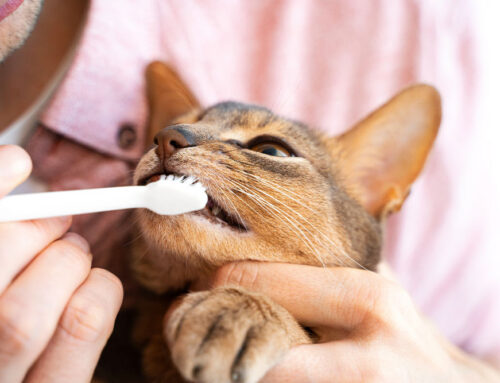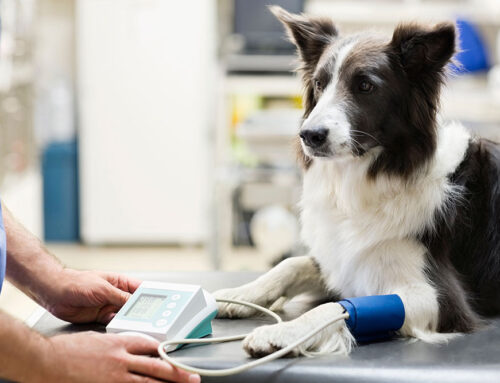Do you believe that poor dental care only causes red gums and stinky breath? Think again. Periodontal problems can lead to widespread infection throughout your pet’s entire body, and can also complicate the management of other diseases, such as diabetes. Begin a well-rounded dental health care plan as soon as you welcome a new pet into your home to stave off serious signs of dental disease.
Why is dental health so important for your pet?
Around 70 to 80 percent of all cats and dogs have some form of dental disease by the age of three, making it one of the most common diseases to attack our pets. While we can’t change the genetic makeup of our household companions, we can prevent bacteria and tartar from taking root. Tackle dental disease head-on to help prevent your pet’s quality of life from taking a nosedive, and bypass painful periodontal conditions, bacterial buildup, and systemic diseases caused by poor oral health.
What are the signs of dental disease?
Besides the hallmark sign of “dog breath,” there are a multitude of signals pointing to dental disease. Watch for these symptoms in your pet:
- Red, inflamed gums
- Sticky, white film covering the teeth
- Hard, yellow-brown substance adhered to the teeth
- Foul odor coming from the mouth
- Excessive drooling
- Pawing at the face or mouth
- Dropping food out of the mouth
- Decreased appetite
- Weight loss
- Chewing on one side of the mouth
- Bleeding gums
- Loose or missing teeth
- Swelling under the eyes
Check for signs of periodontal problems during a weekly oral health check. Staying on top of preventive measures is key to inhibiting the development of major dental issues down the road.
What problems occur with poor dental health?
Dental disease doesn’t just affect your pet’s mouth—it can create serious issues throughout the entire body. Pets who suffer from advanced stages of dental disease can also develop other conditions, such as:
- Kidney disease
- Liver disease
- Heart disease
- Lung disease
- Cancer
- Diabetes complications
- Problems during pregnancy
These serious health issues can develop or worsen due to the presence of dental bacteria. Slipping through gaps in inflamed, damaged gum tissue, oral bacteria can travel throughout the bloodstream, infecting the entire body. Systemic disease can harm major organs or create difficulties in the management of other diseases. Fortunately, many of these conditions improve or are easier to manage once oral bacteria is reduced by dental care.
How can we create a dental health care plan for your pet?
Adhering to a dental care protocol takes a dedicated pet owner. Without routine dental maintenance, plaque can develop a stronghold on your pet’s teeth within four hours. Battling oral bacteria at this stage is the easiest, since plaque hardens into tartar over time. Formulating a strategy that works well for your pet can take some trial and error, but we will help you every step of the way. To create a plan, we use two approaches: at-home care and veterinary support. Helping your pet obtain excellent dental hygiene is key to preventing periodontal problems. Consider adding these steps to your dental health care plan:
- Pick products proven to prevent dental disease. Before hitting up Chewy and loading your cart with an assortment of dental products, do some research. Check out the Veterinary Oral Health Council’s list of approved products, all of which are scientifically proven to slow the accumulation of plaque and tartar.
- Choose an appropriate diet. Shopping for a pet diet can be overwhelming. Aisles are filled with products claiming to be the best in nutrition for your furry friend. So, where do you turn? Keep the basics in mind—skip on the starches and sugars to prevent dental disease.
- Tackle tooth brushing. Motivating your child to brush her teeth may be more difficult than teaching your pet to accept a toothbrush. Take it slow, reward frequently, and always be sure to use a pet-safe toothpaste that is free from fluoride and xylitol. Build up to daily brushing sessions.
- Engage in oral health checkups. Early detection of issues is critical to preventing more serious dental problems. Ideally, you will notice signs of dental disease during brushing sessions, but also make a point of checking for any odd swellings, masses, or painful areas.
Add in veterinary supportive care as needed to provide a fresh slate for dental health. We may recommend more frequent oral examinations than the standard annual visit if your pet is prone to dental issues. Some pets may require twice yearly cleanings due to factors beyond your control. Nothing beats a thorough oral exam, dental X-rays, and a comprehensive cleaning, scaling, and polishing treatment at the hands of our skilled veterinary team.
Questions about your pet’s dental health? Give us a call!








Leave A Comment